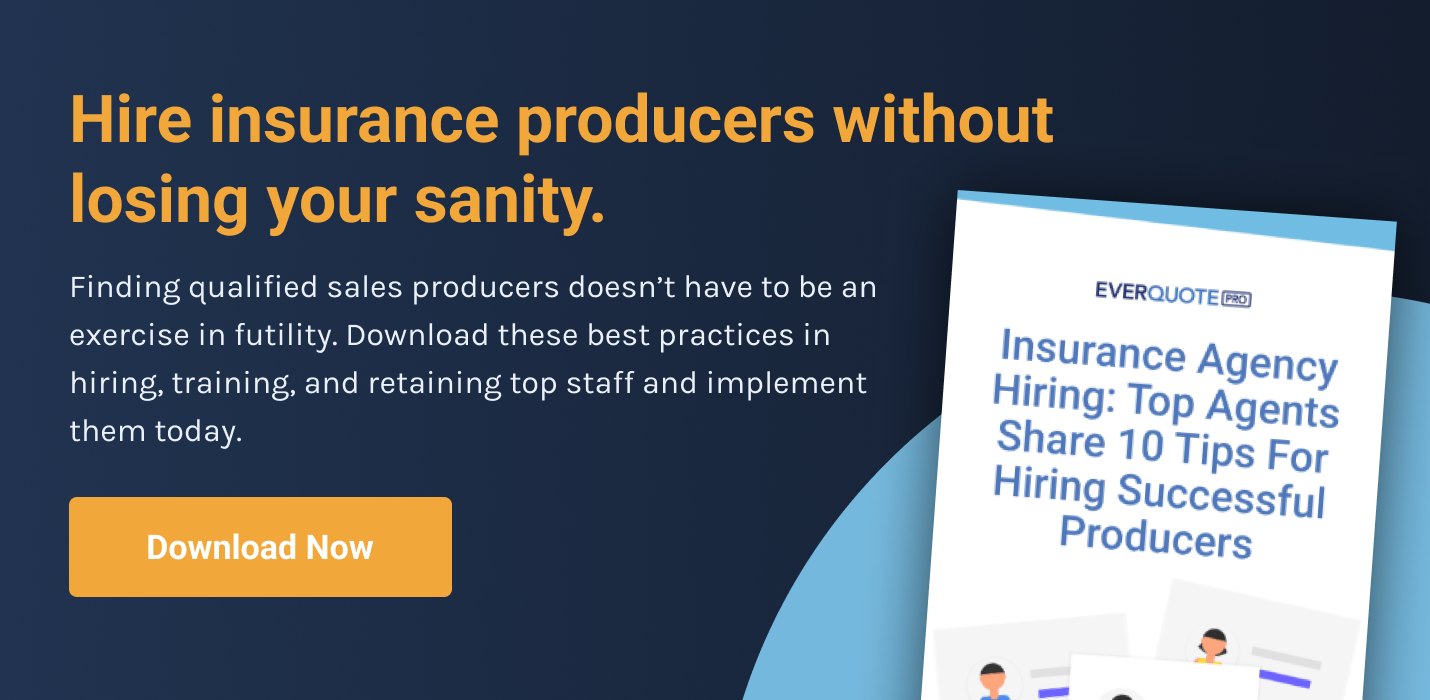- Home»
- EverQuote Pro Blog»
- What's The Best Incentive Program For Insurance Agents?
What's The Best Incentive Program For Insurance Agents?

For many insurance agents, the question is when, not if, they will have to take action to improve production in their insurance offices. But how to do it?
Consider the carrot vs. the stick.
Instead of trying to improve producer performance by tacking on more rules, buckling down on autonomy, or adding more meetings, consider incentivizing your producers to work toward the goals you have for your agency. Incentivization is one of the quickest ways for successful agencies to improve their strategic benchmarks, and it’s not difficult to implement. (Tweet this!) Here are four perspectives to consider when creating a successful incentive program for insurance agents and producers.
Certain practices can take agents and their companies from average to excellent—are you missing out? Download now: 10 Things Every Agent Should Be Doing (But That Most Aren’t)
Why are incentive programs important?
The incentive program you offer is indicative of your company culture—with it, you’re not only showing top-down appreciation and support for your team, you’re also financially growing your employees, which means you will be able to keep your great staff for a longer period of time. Byproducts of incentive programs include increased employee retention, recruiting of better talent, and, ultimately, financial growth for your agency.
4 Insurance Sales Incentive Program Ideas That Work
Note: Before you establish any incentive programs, make sure you have created strategic long-term and short-term goals and are tracking your progress toward them. If you’re not sure what you should be tracking, check out this post. Once you know what types of outputs need to increase, you can incentivize your producers for those outputs specifically.
1. Incentivize Output
Incentive programs for insurance agents that focus on optimizing output are typically very successful because they allow all agents and producers to be eligible for an incentive. Output incentives are a competition against one’s own past performance, not a competition among other producers.
Output Incentive Examples:
- Cash for agents dialing out 150 times per day
- Visa gift cards for producers getting a certain amount of talk time per dial
I typically recommend cash and gift cards as incentives because producers have the most flexibility to use them. Really, any incentive that is open-ended is preferred—just make sure you’re staying in line with your company’s guidelines.
2. Incentivize Performance
Focusing on the performance perspective of your team is another way to increase activity. Typically, this means giving producers extra money (in addition to commission) if they hit benchmarks by a certain date. With this incentivization, you need to make sure the performance benchmarks you’ve set are realistic and attainable for your producers; if no one can achieve them, they will backfire.
Performance Incentive Example:
- For every bound policy written beyond the monthly goal producers get an extra $10 in addition to commission
3. Incentivize Behavior
This incentive program is based on improving specific behaviors of producers. By incentivizing specific behaviors that help drive revenue, you can align the KPI’s that drive your agency’s bottom line with incentives that reward your team for these behaviors.
Behavior Incentive Example:
- For every multiline policy producers quote they receive an extra $5
- Reward producers with an extra $10 for each non-core product (health, life, disability, etc.) written in addition to auto/home
- Reward producers who exceed your weekly averages for appointments set or quotes given (ie. exceed average weekly appointments set or average weekly quotes given by 10 and get an extra $50)
4. Incentivize Your Clients
In addition to incentivizing sales producers, insurance agents should be incentivizing their client base for referrals and cross sales. Insurance referral programs are probably the most effective incentivization program an agency can offer, because the person on the other end is already your customer. Client incentivization usually involves giving customers a small incentive for sharing referral names along with introductions, and then offering them an additional bonus for every new client who signs up.
Client Incentive Example:
- Send clients a $5 gift card for every new name you get along with an email introduction, and a $25 gift card for each person who buys a policy
It’s important to point out that there are a range of different laws depending on what state(s) you do business in. In many states, agents can pay a customer a “finder’s fee” for a referral, but they cannot pay a referral fee to another licensed agent, as it would be considered to fall under the rubric of “commission splitting.” It’s extremely important that you are aware of the relevant laws in your state regarding referral payments and abide by them.
7 Best Practices For Your Incentive Program
- Don’t be too specific with who qualifies for your incentives. Apply them across the board, so everyone in your agency has a fair opportunity to earn the incentive.
- Respect your team’s free time when considering incentives. Although incentivized events like after-hours parties or get-togethers may sound fun, these types of events take up time in your team’s off hours—time they should be enjoying away from the office.
- Don’t overspend. Consider your budget, and understand how you will scale your incentive program for the long term. If you can’t afford to provide an incentive now, don’t offer it until you can do so sustainably.
- Follow through. Not receiving an award that was promised is demoralizing to everyone, and can erode your team’s trust in you.
- Maintain an even playing field. Create incentives with the entire staff in mind, and ensure they all have the same “starting line.” Also, pay special attention to new team members who don’t have a large book of business, and make sure their goals and benchmarks are fair.
- Increase the value of your incentives as client and employee loyalty increases. For both the people on your team and your customers, incentives should become more valuable every year they stick with you. The more tenured an employee or client is, the more they should get. One agency I know does something especially nice for team members who stay on his team: He offers them the opportunity to decide on an incentive for themselves—a tactic that he says is especially effective.
- Finally, don’t hoard success. “Share the wealth” with your team, and offer generous incentives to your people for helping you get your bonus, too.
Fill up your producers’ pipelines with help from EverQuote.
To make sure your producers have every chance to meet their goals and increase your client base, talk to us at EverQuote. We provide high-quality leads that are delivered in real-time and are never recycled, giving you and your producers the best chance to reach out to people who actually intend to buy insurance, and who fit your insurance model. We tap the internet to find you customers who can bring in real business, real growth, and real ROI for your agency.
Unlock predictable growth with EverQuote.
Our representatives are standing by to help you succeed.
Call 844-707-8800
Weekdays, 9AM-5PM (ET)
Call 844-707-8800
Weekdays, 9AM-5PM (ET)
Accelerate your growth.
Complete the form below or just call 844-707-8800 to learn how we can help you achieve your goals.
By clicking "Get Started", I consent by electronic signature to being contacted by EverQuote, including by automatic telephone dialing and/or an artificial or prerecorded voice (including SMS and MMS - charges may apply), regarding EverQuote for Agents, even if my phone number is listed on a Do Not Call Registry. I also understand that my agreement to be contacted is not a condition of purchasing any goods or services, and that I may call (844) 707-8800 to speak with someone about EverQuote for Agents.
By clicking "Get Started", I affirm that I have read and agree to this website’s Privacy Policy and Terms of Use, including the arbitration provision and the E-SIGN Consent.
* Mandatory fields
 Product Overview
Product Overview Blog
Blog FAQs
FAQs Webinars
Webinars eBooks & Resources
eBooks & Resources